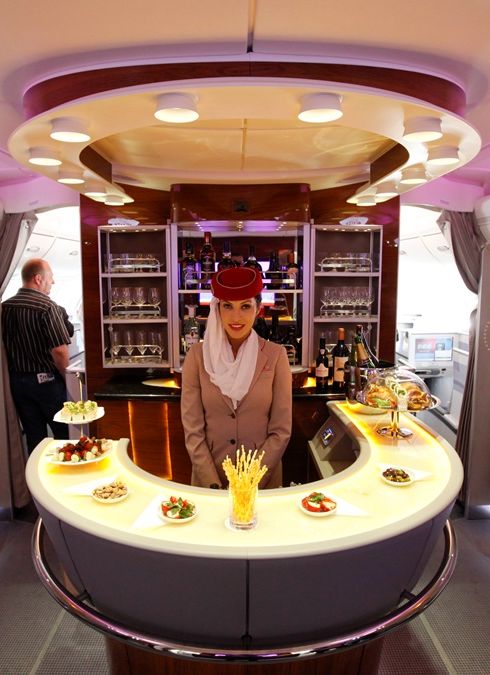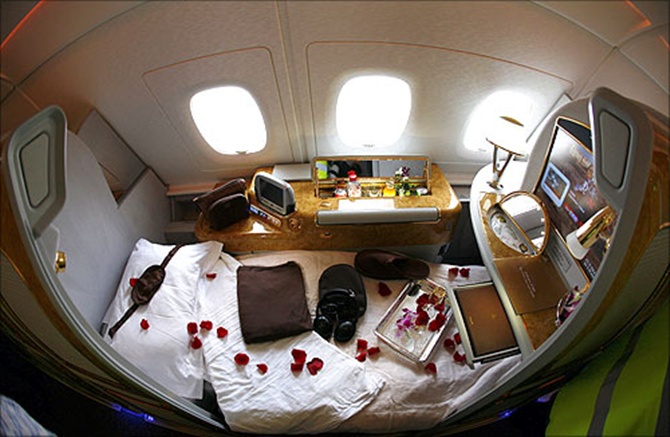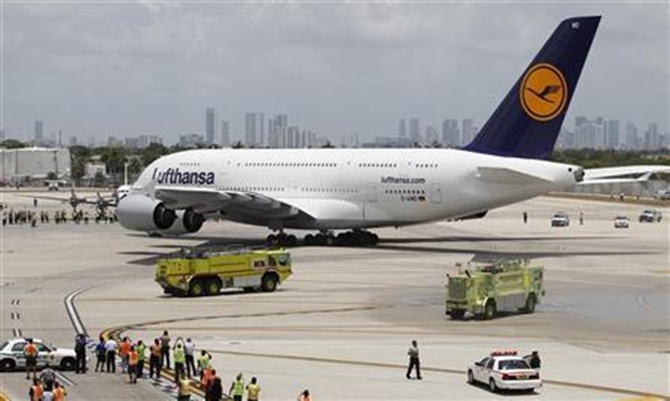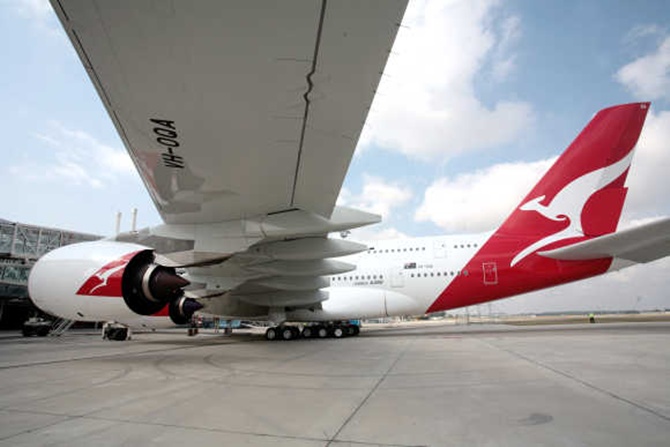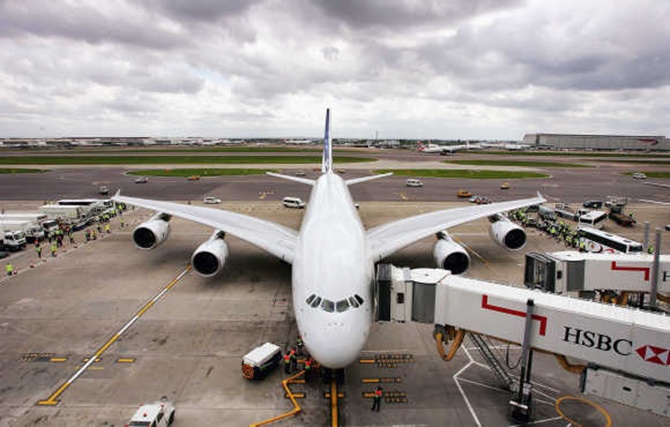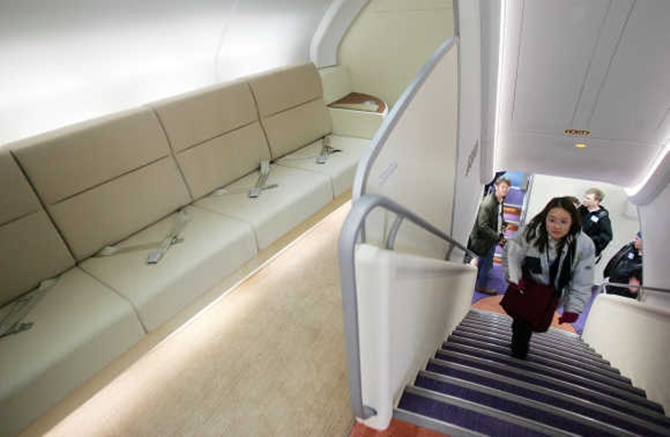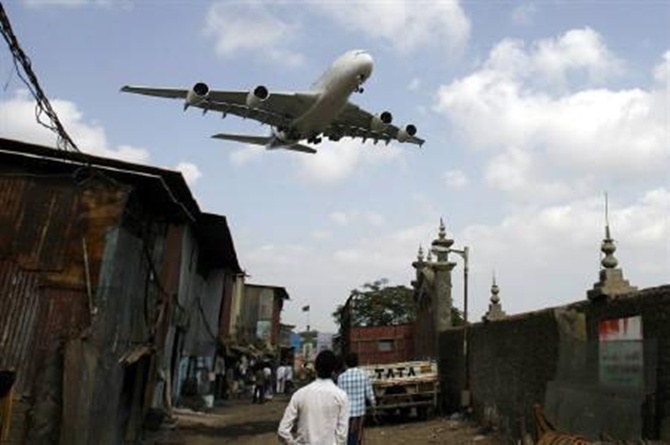 | « Back to article | Print this article |
Stunning Superjumbo A-380s may fly to India
In a step forward, the Civil Aviation Ministry on Wednesday met for the first time to decide on allowing the Airbus A-380s to operate at some airports, years after some major foreign carriers sought the right to fly these superjumbos to India.
Preliminary discussions were held at the meeting chaired by Civil Aviation Secretary K N Shrivastava and attended by DGCA Arun Mishra, Air India CMD Rohit Nandan and officials of the Ministry.
Click NEXT to read more...
Stunning Superjumbo A-380s may fly to India
Official sources said a decision on the issue would be taken only after these officials take the views of all Indian carriers, but no date for such a meeting has been fixed.
The Indian airlines have so far been opposed to the entry of the superjumbo as they feel that a large chunk of passenger traffic out of India would be captured by the foreign carriers flying these aircraft, they said.
Click NEXT to read more...
Stunning Superjumbo A-380s may fly to India
Today's meeting came in the wake of investments in Indian carriers by three major foreign carriers, two of which -- Singapore Airlines and Etihad -- own and operate the A-380s.
AirAsia does not fly these fully double-decker, wide-body and twin-aisled long-haul jets.
Click NEXT to read more...
Stunning Superjumbo A-380s may fly to India
The other carriers which have been wanting to operate these aircraft, which can accommodate over 525 passengers in a three-class configuration, are Lufthansa and Emirates.
These airlines have submitted applications to fly the superjumbos as early as in 2008-09.
Click NEXT to read more...
Stunning Superjumbo A-380s may fly to India
The sources said changes in the bilateral air services agreements (ASAs), which India has with a large number of countries, would have to be made to give effect to a decision to allow the A-380s, whenever it is taken.
The ASAs would have to be re-worked to include a cap on seats instead of frequencies, as the Indian carriers are concerned over the fact that a foreign carrier could fly A-380s as per their country's ASAs and take away a large chunk of air travellers on a particular route.
Click NEXT to read more...
Stunning Superjumbo A-380s may fly to India
The largest aircraft type mentioned in many of the bilaterals are the Boeing 747s, which would also need to be changed in the ASAs, the sources said.
They said the time slots at airports having large terminals and parking space would have to be decided to enable the superjumbos to land and park.
Click NEXT to read more...
Stunning Superjumbo A-380s may fly to India
The immigration, customs and ground handling facilities would also have to be enhanced to cater to the large number of passengers coming out of these planes.
The ASAs specify the number of seats or flights per week, the point of calls or destinations in the two countries and the type of aircraft to be flown.
They currently allow any aircraft type not larger than Boeing 747 to fly.
Click NEXT to read more...
Stunning Superjumbo A-380s may fly to India
The foreign carriers were barred from flying the A-380s into India since 2007-08 when Singapore Airlines, Lufthansa and Emirates started inducting these planes into their fleet and the Indian air traffic was on a high growth path.
But the decision not to allow them was taken in view of the fact that no Indian carrier, including Air India and Jet Airways, had such a large aircraft and would face unequal competition from their foreign counterparts.
Click NEXT to read more...
Stunning Superjumbo A-380s may fly to India
The second reason was that most of the airports then were not equipped to handle such large aircraft, the high number of passengers it would carry and their exit from the upper and lower decks of the double-decker A-380.
The A-380s have already made debut flights to Delhi, Mumbai and at the airshows in Hyderabad.
Click NEXT to read more...
Stunning Superjumbo A-380s may fly to India
A few years ago, an A-380 had even made an emergency landing at Hyderabad on its way from Australia.
Currently, only airports at Delhi, Hyderabad and Bangalore can handle the A-380s in terms of capacity of the runway, aerobridges, fire fighting response, ground handling facility and terminal capacity.
